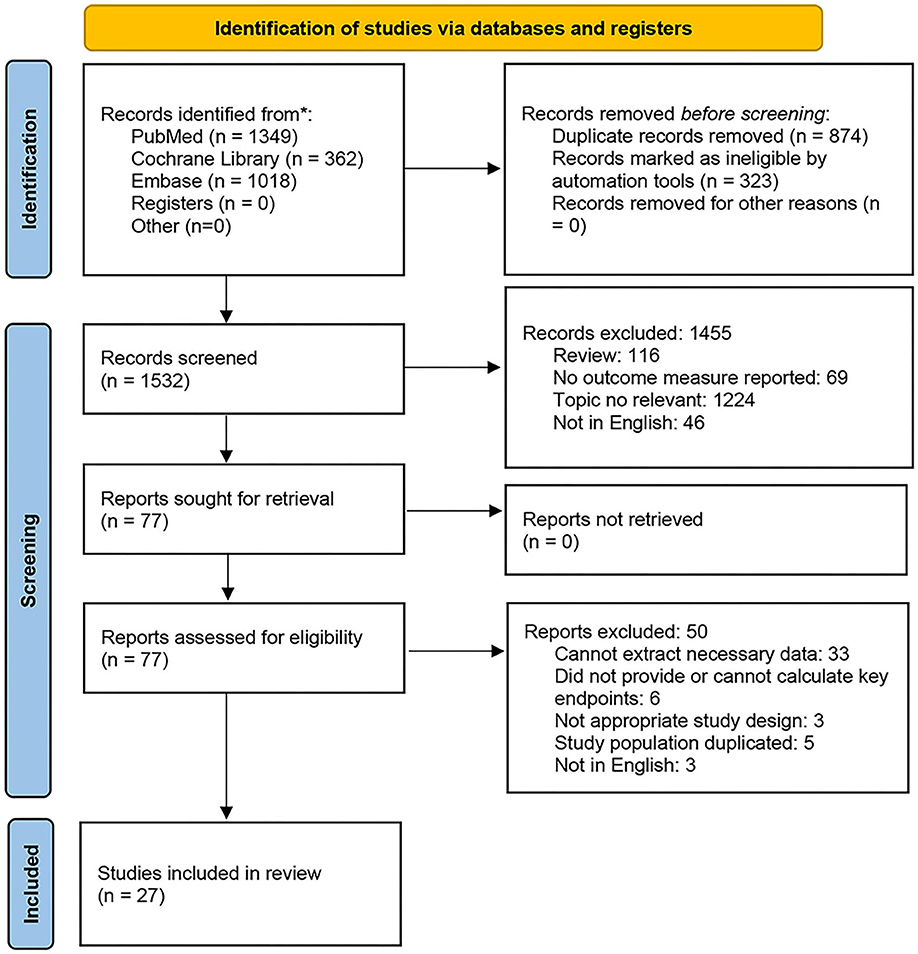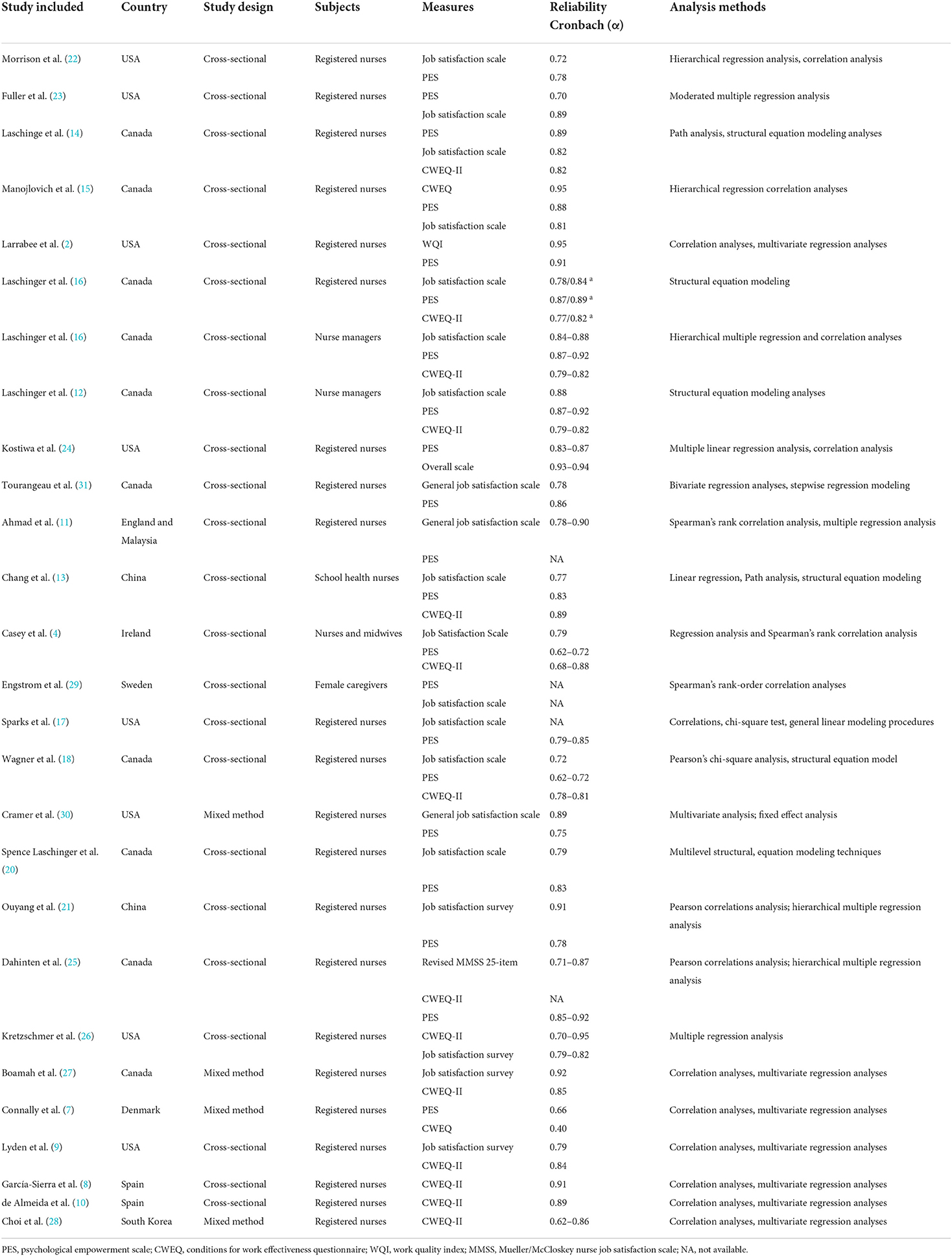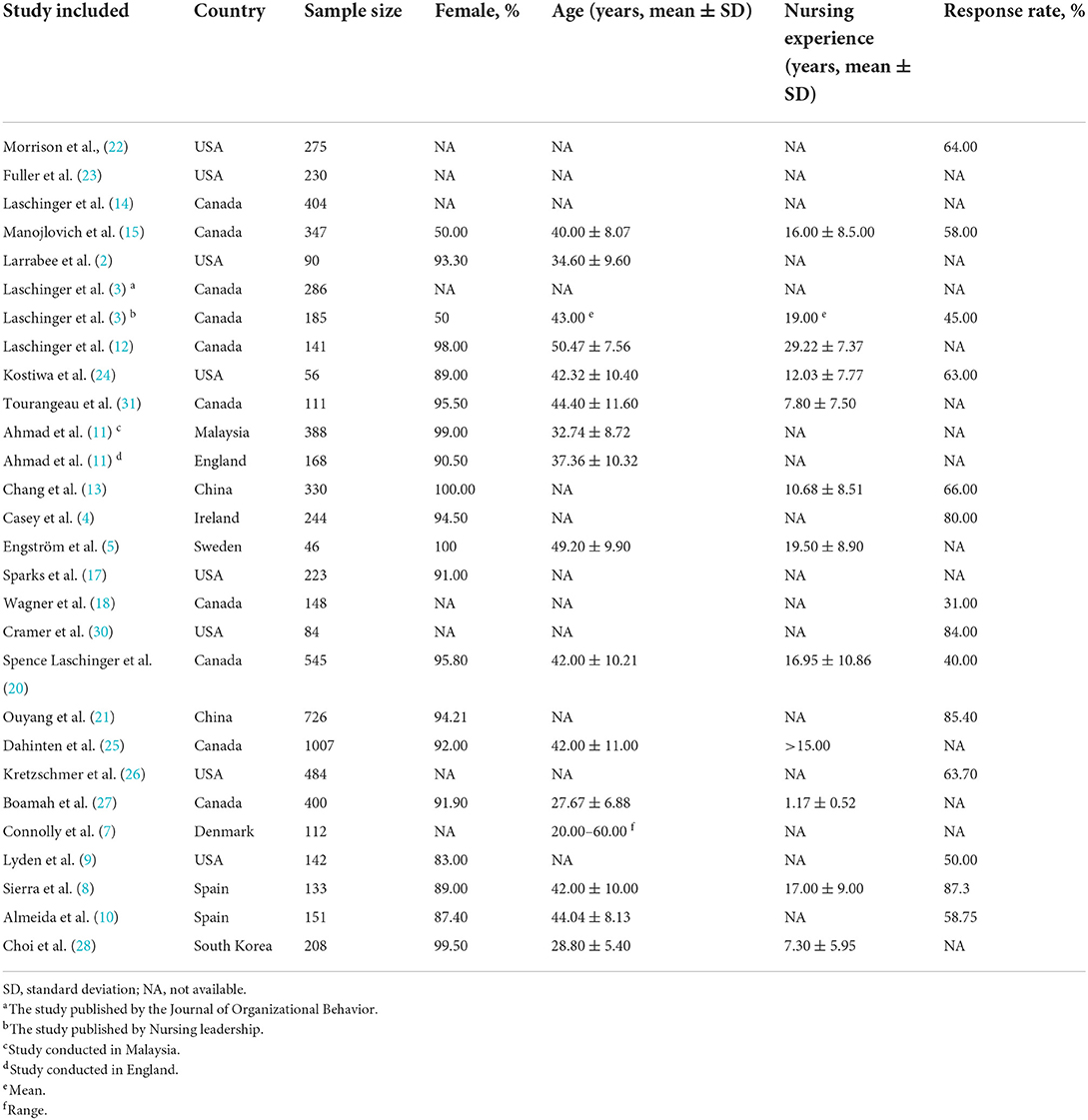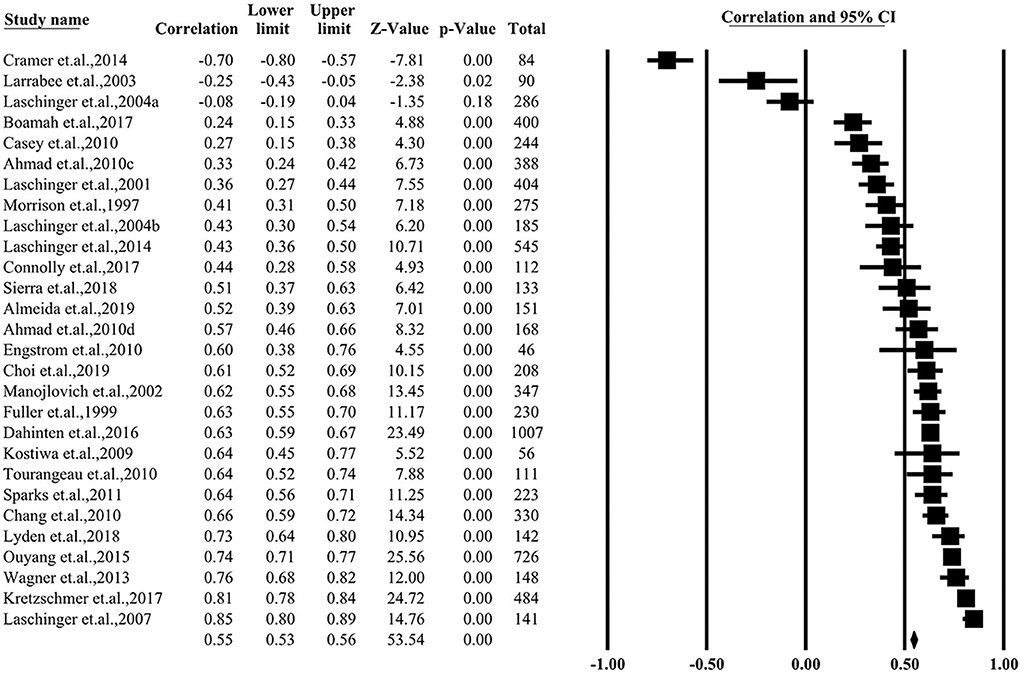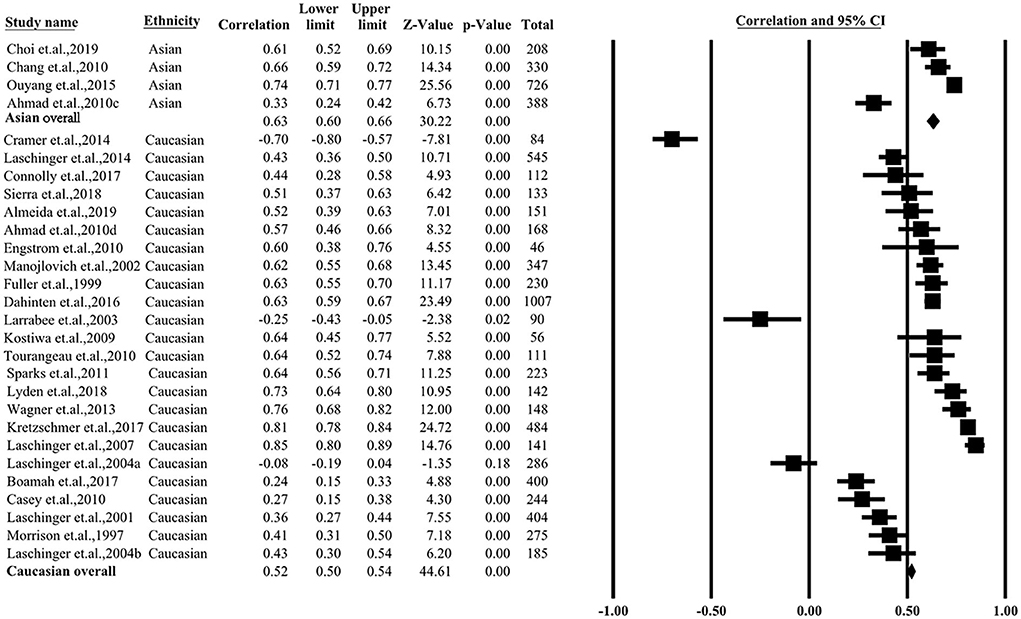- 1School of Nursing and Health, Shanghai Zhongqiao Vocational and Technical University, Shanghai, China
- 2Department of Nursing and Home Economics, Shanghai Open University Yangpu Branch, Shanghai, China
- 3Department of Interventional Oncology, Renji Hospital, Shanghai Jiao Tong University School of Medicine, Shanghai, China
Background: Psychological empowerment is generally understood to be associated with job satisfaction among nurses. However, recently published literature has questioned this association.
Objective: We aimed to systematically investigate through a meta-analysis the association of psychological empowerment with job satisfaction among nurses.
Methods: PubMed, Medline, Cochrane Library, PsycInfo, and Embase were used to search targeted studies from conception to 20 January 2022. The correlation coefficients of each study were extracted and converted into Fisher's Z. Finally, pooled r was calculated by Fisher's Z and standard error (SE).
Results: A total of 28 studies encompassing 27 articles with 7,664 registered nurses were included. The pooled correlation coefficient between psychological empowerment and job satisfaction was 0.55. Subgroup analyses were conducted according to ethnicity, and the correlation in the Asian participants (P < 0.01) was significantly stronger (P < 0.05) than that of the Caucasian nurses (P < 0.01).
Conclusions: Psychological empowerment is strongly correlated to job satisfaction for registered nurses, especially among those from Asian countries. Interventions designed for psychological empowerment could be one of the strategies to promote the retention of nurses. Nonetheless, additional future studies are essential for more investigations.
Introduction
Several factors, such as complications in nursing practice, workload, and workplace conditions, might individually or in combination lead to internal frustration or emotionally exhaust the nurses (1), and lead to a nursing shortage (1). The lack of an adequate nursing population aggravates psychological and physical health problems, which ultimately results in emotional exhaustion among nurses. Job satisfaction for nurses could be influenced by their working environment, personal characteristics, and organizational factors (1).
Despite the shortage of human and financial resources, the management of nurses must maintain high-quality standards regarding patient care and job satisfaction. Psychological empowerment mainly focuses on the nurses' workplace and is deemed as a strategy to prevent emotional exhaustion. However, whether psychological empowerment is an internal incentive factor and can influence nurse job satisfaction and outcomes is yet controversial (2–5).
In 2018, a meta-analysis (6) focused on this aspect and emphasized the impact of psychological empowerment on job satisfaction in nurses. However, in recent years, several studies (7–9) have provided new evidence (10), indicating that psychological empowerment might not be associated with job satisfaction among nurses. Therefore, conducting a new meta-analysis by pooling the newly published literature may systematically review current published evidence and provide convincing findings on this topic. In this study, we aimed to further investigate the association between psychological empowerment and job satisfaction among nurses.
Methods
This current study was performed following the Preferred Reporting Items for Systematic Reviews and Meta-analysis guidelines (PRISMA) statement.
Literature identification
PubMed, Medline, Cochrane Library, PsycInfo, and Embase databases were used to search for studies from their inception to 20 January 2022. The search terms included: “nurse”, “nurses”, “empower”, “job satisfaction”, “work satisfaction”, “psychological empowerment”, and “empowerment”. We used these search strings as broadly as possible. Google Scholar was used for studies citing relevant studies.
Eligibility criteria
Articles that addressed the topic of the impact of nurses' psychological empowerment initiatives on their job satisfaction were included. Studies that met the following criteria were included: (1) studies included nurses as participants; (2) studies explored the association of psychological empowerment with job satisfaction; (3) necessary data could be obtained or calculated.
Studies reporting on other types of empowerment and including non-registered nurses, such as nursing students, nursing assistants, and allied healthcare professionals, were excluded. Qualitative studies, reviews, case reports, comments, conference abstracts, and studies that were not available were also excluded.
Data extraction
All studies obtained from the above databases were screened and assessed independently by two authors. All needed information was extracted using a standardized form by the two authors independently, and a consensus was reached on all items in discussion with a third author. For each included study, the authors extracted the characteristics of the studies (author, publishing year, country, and sample size), participant information (mean age and the proportion of females), constructs measured (the scale used, number of items, means, and reliability), and the correlation coefficients.
Quality scoring of studies
The two authors used the published quality assessment and validity tool for correlational studies. A consensus was reached on all inconsistent items through a discussion with another author. The tool assessed the quality of the included studies using 13 items to score the study design, sample size, measurements of result, and statistical analysis. The studies were awarded a maximum of one point for each of the 12 items (prospective studies, probable sampling, proper sample size, sample drawn from multiple sites, anonymity protected, response rate more than 60%, reliable measure of outcome, an efficacious measure of outcomes, empowerment internal consistency, theoretical framework used, correlation analysis for multiple effects, and management of outliers addressed), and a maximum of two points for one item (a valid measure of empowerment). The detailed items are presented in Supplementary Table 1. The score ranged from 0 to 14 points, where 0–4 points indicated poor quality, 5–9 points meant medium quality, and 10–14 points indicated high quality.
Analysis
The correlation coefficient (r) for each study was extracted and transformed to Fisher's Z and standard error (SE), and the final effect size was calculated as the pooled r and 95% confidence interval (CI) based on the random-effects model. Due to different ethnicities and cultural backgrounds, subgroup analysis was done according to the source of the study population (Caucasian group vs. Asian group).
The standard heterogeneity test based on the I2 statistic was used to assess the consistency of the effect sizes. Heterogeneity was deemed to be significant if I2 ≥ 50%. For analysis with significant heterogeneity, we examined the robustness of the pooled result by using the leave-one-out method. In addition, studies with low or medium-quality scores were separated from those with high quality for the sensitivity analysis. We assessed the publication bias using Begg's and Egger's weighted regression methods. The publication bias was performed by STATA 15.0 (Stata Corporation, College Station, TX, USA). A P-value of <0.05 was considered statistically significant.
Ethics approval
No ethical approval and informed consent were required because the present study was a network meta-analysis of published studies.
Results
Study selection
The flowchart of study retrieval and selection is displayed in Figure 1. In total, 2,729 studies were retrieved and 874 were excluded due to duplication among various datasets. Following the above-mentioned inclusion and exclusion criteria, 1,455 abstracts or titles were assessed initially. After reading 77 full-length manuscripts, ultimately, 27 articles were included. One of the included studies (11) was a comparative analysis of nurses in Malaysia and England and was classified by ethnicity.
Study characteristics
A total of 28 studies were included in the present study and these were published between 1997 and 2019. The sample size of nurses included in these studies ranged from 56 to 1007, with a total of 7664 nurses. Most of the studies included clinically registered nurses and two nurse managers (3, 12), one school health nurse (13), nurses, midwives (4), and female caregivers (5). Most of the studies (85%) were cross-sectional. Ten of the included studies were conducted in Canada (3, 12, 14–21), eight in USA (2, 9, 19, 22–26), two each in China (13, 27) and Spain (8, 10), and one each in England (11), Malaysia (11), Ireland (4), Denmark (7), Sweden (5), and South Korea (28). The measures for job satisfaction were the “job satisfaction scale” or “general job satisfaction scale.” About 93% of the researchers assessed psychological empowerment using the “psychological empowerment scale” or “conditions for work effectiveness questionnaire.” Most of the participants were female, and the mean age of the participants was 28–50 years. The mean years of their nursing experience ranged from 1.17 to 29.22 years. Of the 28 studies, 14 of them reported a response rate of> 50%. The characteristics of the included studies and participants are summarized in Tables 1, 2.
Quality assessment
Supplementary Table 2 shows the results of the quality assessment. Seven studies were assessed as high quality (≥ 10 points), and 21 as medium (6–9 points) (Supplementary Table 2). All the included studies exhibited acceptable quality.
Correlation between psychological empowerment and job satisfaction
The correlation between psychological empowerment and job satisfaction in the included studies varied largely. Two studies reported negative correlations (r < 0, P < 0.05) and four studies observed weaken correlations (0 < r < 0.4, P < 0.01). Five studies reported a strong correlation (r > 0.7, P < 0.01). The pooled r for all studies was 0.55 (95% CI = 0.53–0.56, P < 0.01) with a significant heterogeneity (I2 = 90%). The detailed data and funnel plot are depicted in Figure 2 and Supplementary Figure 1, respectively.
Correlation between psychological empowerment and job satisfaction grouped by ethnicity
The studies from Canada (3, 12, 14–21), USA (2, 9, 19, 22–26), Spain (8, 10), England (11), Ireland (4), Denmark (7), and Sweden (5) were categorized into the Caucasian group. The studies conducted in South Korea (28), China (13, 27), and Malaysia (11) were categorized into the Asian group. When pooling the Caucasian group, the pooled r for all studies was 0.52 (95% CI = 0.50–0.54, P < 0.01, I2 = 89%). The pooled correlation among the Asian group presented a coefficient (P < 0.05) of 0.63 (95% CI = 0.60–0.66, P < 0.01, I2 = 88%). The data are graphically summarized in Figure 3.
Exploration of heterogeneity
To explore the source of existing heterogeneity, we first pooled the studies by study design, cross-sectional method, and mixed method. The heterogeneities were found to be 90 and 89%, respectively. Then, the studies with high quality were pooled. As shown in Supplementary Figure 2, the pooled r for the studies with high-quality was 0.54 (95% CI = 0.41–0.64, P < 0.01). The heterogeneity (I2 = 61%) decreased to a moderate level. Additional analysis was carried out according to the sample size; however, high heterogeneity was observed.
Publication bias
No potential publication bias was seen with P-values of Begg's rank correlation analysis and Egger's weighted regression analysis >0.05 (Supplementary Table 3).
Discussion
Main findings
In our meta-analysis, 28 studies with a total of 7,664 registered nurses were included for data analysis. All the included studies were of moderate or high quality. The correlation between psychological empowerment and job satisfaction was 0.55 (95% CI = 0.53–0.56, P < 0.01) irrespective of the source of the study population. Furthermore, the correlation among Asian group presented a slightly higher coefficient (P < 0.05) (r = 0.63) than that among the Caucasian group (r = 0.52).
Comparison with previous studies
To date, one meta-analysis has investigated the association between psychological empowerment and job satisfaction in registered nurses (6). In this previous meta-analysis (6), the authors estimated the correlation between psychological empowerment and job satisfaction based on 11 eligible studies although a total of 20 studies were included finally. It showed that psychological empowerment and job satisfaction were significantly positively correlated (p < 0.001), but only moderately correlated (r = 0.353). Compared to the previous meta-analysis, the current meta-analysis revealed a strong correlation between psychological empowerment and job satisfaction (r = 0.55). Notably, the number of studies included in the current meta-analysis was 28, which was significantly more than that of the previous meta-analysis (n = 11). In addition, a significantly larger sample size of nurses was included (7,764 vs. 4,167). Undoubtedly, the current meta-analysis yielded more reliable and robust results than the previous meta-analysis. Moreover, the current meta-analysis also performed subgroup analyses to determine the correlation between psychological empowerment and job satisfaction from different population sources, providing more accurate results on this topic.
Interpretation of findings
Psychological empowerment was deemed as a process that accompanied interaction between one's internal personal characteristics and the organization's environment. Specifically, psychological empowerment consists of four cognitive experiences (32): alignment between job requirements and beliefs, an individual's confidence in the ability to perform the activity skillfully, the sense of choice or control over one's work/autonomy and the commencement and maintenance of work activities in the workplace, and the sense of ability to influence important work outcomes. Previous studies concluded that the interaction between the external environment and inner individuality might be promoted by psychological empowerment (33, 34). Given the importance of psychological empowerment as an internal motivator, empowerment only has an impact when employees believe they are empowered (35). Studies have demonstrated that a high level of psychological empowerment is associated with lower stress, burnout and turnover intentions, higher organizational commitment, and job satisfaction (21, 36, 37). Furthermore, nurses who had structural empowerment were more likely to have positive beliefs about their capacity to contribute meaningfully to the workplace than nurses who did not have structural empowerment, and as a result, their job satisfaction increased (3, 16).
On the other hand, the current meta-analysis revealed that the correlation between psychological empowerment and job satisfaction in the Caucasian group was slightly lower than that in the Asia group. These inconsistent findings between the two groups might be explained according to the following reasons. First, nurses in various countries or regions have a diverse understanding of empowerment. In China, psychological empowerment is explained as a dynamic complementarity to prevent conflicts with authority figures, which might be influenced differently by Asian and Western cultures. Second, the working environments for nurses in Asian and Western countries varied markedly. Among the items assessing job satisfaction, supervision, nature of work, and communication were identified as crucial factors. The high workload and low compensation in Asian hospitals could be intervening obstacles in Asian studies, establishing a higher correlation between psychological empowerment and job satisfaction.
Limitations
It is necessary to consider the limitations of the present study while interpreting the findings. First, most studies were cross-sectional, which might limit the ability to estimate causation and decrease the generalizability of the results. Second, a small number of studies were included, and a majority of them were conducted in Western countries and focused on the Caucasian population. The findings might be affected by environmental, medical level, and genetic factors, which can only partially annotate the associations, and the representativeness for the target population might be weakened. Moreover, the varied scales used in the included studies to examine both constructs of interest might also cause heterogeneity. Third, the measure of psychological empowerment and job satisfaction varied largely. A large proportion of the studies used widely applied methods. In addition, there are several definitions of psychological empowerment and job satisfaction. The definition of the targeted population is based on heterogeneity; also, it reduced the stability of the results. Fourth, the estimation of the reliability by Cronbach's coefficient varied according to the studies. Therefore, we could not correct attenuation, which might reflect the true effects. Finally, there were many intermediary factors affecting the relationship between psychological empowerment and job satisfaction; however, relevant data could be analyzed and summarized yet. Therefore, more studies are needed in the future to investigate the role of these intermediary factors.
Conclusions
In this study, we summarized the correlations between psychological empowerment and job satisfaction and pooled results obtained from 28 studies. Next, we observed a significant correlation between psychological empowerment and job satisfaction. Moreover, the pooled correlation among the Asian group was slightly higher than that of the Caucasian group. Strategies to provide relief from psychological burdens would be beneficial to address mental exhaustion.
Implications for practice and future studies
This meta-analysis will first assist administrators and hospitals in developing strategies for creating and maintaining an empowered workplace which will in turn increase job satisfaction among nurses and reduce turnover. Second, this study also suggests that additional research with larger sample sizes should be conducted in various counties to verify our findings. Finally, it is necessary to conduct more longitudinal, qualitative, and interventional studies to confirm the causal link between psychological empowerment and nurse job satisfaction.
Data availability statement
The original contributions presented in the study are included in the article/Supplementary material, further inquiries can be directed to the corresponding author/s.
Author contributions
Study design: LG. Data collection: LW and BP. Data analysis: LG, LW, and BP. Manuscript writing: LG and LW. All authors contributed to the article and approved the submitted version.
Conflict of interest
The authors declare that the research was conducted in the absence of any commercial or financial relationships that could be construed as a potential conflict of interest.
Publisher's note
All claims expressed in this article are solely those of the authors and do not necessarily represent those of their affiliated organizations, or those of the publisher, the editors and the reviewers. Any product that may be evaluated in this article, or claim that may be made by its manufacturer, is not guaranteed or endorsed by the publisher.
Supplementary material
The Supplementary Material for this article can be found online at: https://www.frontiersin.org/articles/10.3389/fpubh.2022.1022823/full#supplementary-material
References
1. Cho J, Laschinger HK, Wong C. Workplace empowerment, work engagement and organizational commitment of new graduate nurses. Nurs Leadersh (Toronto, Ont). (2006) 19:43–60. doi: 10.12927/cjnl.2006.18368
2. Larrabee JH, Janney MA, Ostrow CL, Withrow ML, Hobbs GR, Burant C. Predicting registered nurse job satisfaction and intent to leave. J Nurs Adminis. (2003) 33:271–83. doi: 10.1097/00005110-200305000-00003
3. Laschinger HK, Almost J, Purdy N, Kim J. Predictors of nurse managers' health in Canadian restructured healthcare settings. Nurs Leadersh (Toronto, Ont). (2004) 17:88–105. doi: 10.12927/cjnl.2004.17020
4. Casey M, Saunders J, O'Hara T. Impact of critical social empowerment on psychological empowerment and job satisfaction in nursing and midwifery settings. J Nurs Manag. (2010) 18:24–34. doi: 10.1111/j.1365-2834.2009.01040.x
5. Engström M, Wadensten B, Häggström E. Caregivers' job satisfaction and empowerment before and after an intervention focused on caregiver empowerment. J Nurs Manag. (2010) 18:14–23. doi: 10.1111/j.1365-2834.2009.01047.x
6. Li H, Shi Y, Li Y, Xing Z, Wang S, Ying J, et al. Relationship between nurse psychological empowerment and job satisfaction: a systematic review and meta-analysis. J Adv Nurs. (2018) 74:1264–77. doi: 10.1111/jan.13549
7. Connolly M, Jacobs S, Scott K. Clinical leadership, structural empowerment and psychological empowerment of registered nurses working in an emergency department. J Nurs Manag. (2018) 26:881–7. doi: 10.1111/jonm.12619
8. García-Sierra R, Fernández-Castro J. Relationships between leadership, structural empowerment, and engagement in nurses. J Adv Nurs. (2018) 74:2809–19. doi: 10.1111/jan.13805
9. Lyden C, Sekula LK, Higgins B, Zoucha R. Job satisfaction and empowerment of self-employed nurse practitioners: a mixed methods study. J Am Assoc Nurse Pract. (2018) 30:78–91. doi: 10.1097/JXX.0000000000000007
10. de Almeida H, Orgambídez A. Workplace empowerment and job satisfaction in portuguese nurses: an explicative model. Health Care Manag. (2019) 38:220–7. doi: 10.1097/HCM.0000000000000265
11. Ahmad N, Oranye NO. Empowerment, job satisfaction and organizational commitment: a comparative analysis of nurses working in Malaysia and England. J Nurs Manag. (2010) 18:582–91. doi: 10.1111/j.1365-2834.2010.01093.x
12. Laschinger HK, Purdy N, Almost J. The impact of leader-member exchange quality, empowerment, and core self-evaluation on nurse manager's job satisfaction. J Nurs Adm. (2007) 37:221–9. doi: 10.1097/01.NNA.0000269746.63007.08
13. Chang LC, Shih CH, Lin SM. The mediating role of psychological empowerment on job satisfaction and organizational commitment for school health nurses: a cross-sectional questionnaire survey. Int J Nurs Stud. (2010) 47:427–33. doi: 10.1016/j.ijnurstu.2009.09.007
14. Laschinger H, Finegan J, Shamian J. Promoting nuses' health: Effect of empowement on job strain and work satisfaction. Nurs Econ. (2001) 19:42–52.
15. Manojlovich M, Spence Laschinger HK. The relationship of empowerment and selected personality characteristics to nursing job satisfaction. J Nurs Adm. (2002) 32:586–95. doi: 10.1097/00005110-200211000-00006
16. Laschinger H, Finegan J, Shamian J, Wilk P. A longitudinal analysis of the impact of workplace empowerment on work satisfaction. J Organ Behav. (2004) 25:527–45. doi: 10.1002/job.256
17. Sparks AM. Theoretical Model of Nurse Outcomes: Associations among Nurse Characteristics, Psychological Empowerment, Generation, Quality of Work life and RN Job Satisfaction. (Dissertations and Theses – Gradworks). Morgantown: West Virginia University ProQuest Dissertations Publishing. (2011).
18. Wagner JI, Warren S, Cummings G, Smith DL, Olson JK. Resonant leadership, workplace empowerment, and “spirit at work”: impact on RN job satisfaction and organizational commitment. Can J Nurs Res. (2013) 45:108–28. doi: 10.1177/084456211304500409
19. Craig P, Petticrew M. Developing and evaluating complex interventions: reflections on the 2008 MRC guidance. Int J Nurs Stud. (2013) 50:585–7. doi: 10.1016/j.ijnurstu.2012.09.009
20. Spence Laschinger HK, Nosko A, Wilk P, Finegan J. Effects of unit empowerment and perceived support for professional nursing practice on unit effectiveness and individual nurse well-being: a time-lagged study. Int J Nurs Stud. (2014) 51:1615–23. doi: 10.1016/j.ijnurstu.2014.04.010
21. Ouyang YQ, Zhou WB, Qu H. The impact of psychological empowerment and organisational commitment on Chinese nurses' job satisfaction. Contemp Nurse. (2015) 50:80–91. doi: 10.1080/10376178.2015.1010253
22. Morrison RS, Jones L, Fuller B. The relation between leadership style and empowerment on job satisfaction of nurses. J Nurs Adm. (1997) 27:27–34. doi: 10.1097/00005110-199705000-00007
23. Fuller JB, Morrison R, Jones L, Bridger D, Brown V. The effects of psychological empowerment on transformational leadership and job satisfaction. J Soc Psychol. (1999) 139:389–91. doi: 10.1080/00224549909598396
24. Kostiwa IM, Meeks S. The relation between psychological empowerment, service quality, and job satisfaction among certified nursing assistants. Clin Gerontol. (2009) 32:276–92. doi: 10.1080/07317110902895309
25. Dahinten VS, Lee SE, MacPhee M. Disentangling the relationships between staff nurses' workplace empowerment and job satisfaction. J Nurs Manag. (2016) 24:1060–70. doi: 10.1111/jonm.12407
26. Kretzschmer S, Walker M, Myers J, Vogt K, Massouda J, Gottbrath D, et al. Nursing empowerment, workplace environment, and job satisfaction in nurses employed in an academic health science center. J Nurses Prof Dev. (2017) 33:196–202. doi: 10.1097/NND.0000000000000363
27. Boamah SA, Read EA, Spence Laschinger HK. Factors influencing new graduate nurse burnout development, job satisfaction and patient care quality: a time-lagged study. J Adv Nurs. (2017) 73:1182–95. doi: 10.1111/jan.13215
28. Choi S, Kim M. Effects of structural empowerment and professional governance on autonomy and job satisfaction of the Korean nurses. J Nurs Manag. (2019) 27:1664–72. doi: 10.1111/jonm.12855
29. Engström M, Wadensten B, Häggström E, Caregivers' Caregivers' job satisfaction and empowerment before and after an intervention focused on caregiver empowerment. J Nur Manag. (2010) 18:14–23.
30. Cramer ME, High R, Culross B, Conley DM, Nayar P, Nguyen AT, Ojha D. Retooling the RN workforce in long-term care: nursing certification as a pathway to quality improvement. Geriatr Nurs. (2014) 35:182–7. doi: 10.1016/j.gerinurse.2014.01.001
31. Tourangeau A, Cranley L, Spence LH, Pachis J. Relationships among leadership practices, work environments, staff communication and outcomes in long-term care. J Nurs Manag. (2010) 18:1060–72.
32. Spreitzer GM. Psychological empowerment in the workplace: dimensions, measurement, and validation. Acad Manage J. (1995) 38:1442–65. doi: 10.2307/256865
33. Hatcher S, Laschinger HK. Staff nurses' perceptions of job empowerment and level of burnout: a test of Kanter's theory of structural power in organizations. Can J Nurs Adm. (1996) 9:74–94.
34. O'Brien JL. Relationships among structural empowerment, psychological empowerment, and burnout in registered staff nurses working in outpatient dialysis centers. Nephrol Nurs J. (2011) 38:475–81.
35. Conger JA, Kanungo RN. The empowerment process: integrating theory and practice. Acad Manage Rev. (1988) 13:471–82. doi: 10.2307/258093
36. Ibrahem SZ, Elhoseeny T, Mahmoud RA. Workplace empowerment and organizational commitment among nurses working at the Main University Hospital, Alexandria, Egypt. J Egypt Public Health Assoc. (2013) 88:90–6. doi: 10.1097/01.EPX.0000430957.52814.8a
Keywords: job satisfaction, meta-analysis, nurses, psychological empowerment, psychological burden
Citation: Gu L, Wang L and Pan B (2022) Psychological empowerment and job satisfaction in nurses: A systematic review and meta-analysis. Front. Public Health 10:1022823. doi: 10.3389/fpubh.2022.1022823
Received: 19 August 2022; Accepted: 03 October 2022;
Published: 11 November 2022.
Edited by:
Joemer Maravilla, The University of Queensland, AustraliaReviewed by:
Restituta Cerbito Tan, De La Salle Medical and Health Sciences Institute, PhilippinesKatalin Papp, University of Debrecen, Hungary
Copyright © 2022 Gu, Wang and Pan. This is an open-access article distributed under the terms of the Creative Commons Attribution License (CC BY). The use, distribution or reproduction in other forums is permitted, provided the original author(s) and the copyright owner(s) are credited and that the original publication in this journal is cited, in accordance with accepted academic practice. No use, distribution or reproduction is permitted which does not comply with these terms.
*Correspondence: Lihua Gu, a2F0ZWd1bGlodWFAcXEuY29t
 Lihua Gu
Lihua Gu Liping Wang2
Liping Wang2